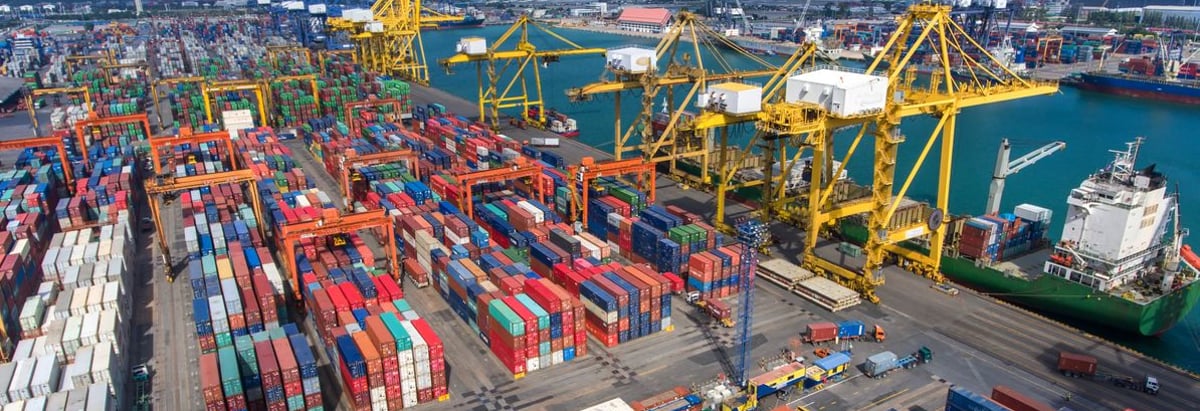Stock Analysis
- Japan
- /
- Infrastructure
- /
- TSE:9301
Does Mitsubishi Logistics (TSE:9301) Have A Healthy Balance Sheet?

Warren Buffett famously said, 'Volatility is far from synonymous with risk.' So it seems the smart money knows that debt - which is usually involved in bankruptcies - is a very important factor, when you assess how risky a company is. We can see that Mitsubishi Logistics Corporation (TSE:9301) does use debt in its business. But should shareholders be worried about its use of debt?
What Risk Does Debt Bring?
Debt assists a business until the business has trouble paying it off, either with new capital or with free cash flow. If things get really bad, the lenders can take control of the business. However, a more usual (but still expensive) situation is where a company must dilute shareholders at a cheap share price simply to get debt under control. Of course, debt can be an important tool in businesses, particularly capital heavy businesses. When we examine debt levels, we first consider both cash and debt levels, together.
Check out our latest analysis for Mitsubishi Logistics
What Is Mitsubishi Logistics's Net Debt?
You can click the graphic below for the historical numbers, but it shows that as of June 2024 Mitsubishi Logistics had JP¥110.9b of debt, an increase on JP¥103.2b, over one year. However, because it has a cash reserve of JP¥64.9b, its net debt is less, at about JP¥46.0b.
How Healthy Is Mitsubishi Logistics' Balance Sheet?
Zooming in on the latest balance sheet data, we can see that Mitsubishi Logistics had liabilities of JP¥86.7b due within 12 months and liabilities of JP¥169.9b due beyond that. Offsetting these obligations, it had cash of JP¥64.9b as well as receivables valued at JP¥51.1b due within 12 months. So it has liabilities totalling JP¥140.6b more than its cash and near-term receivables, combined.
Mitsubishi Logistics has a market capitalization of JP¥358.1b, so it could very likely raise cash to ameliorate its balance sheet, if the need arose. But we definitely want to keep our eyes open to indications that its debt is bringing too much risk.
We use two main ratios to inform us about debt levels relative to earnings. The first is net debt divided by earnings before interest, tax, depreciation, and amortization (EBITDA), while the second is how many times its earnings before interest and tax (EBIT) covers its interest expense (or its interest cover, for short). Thus we consider debt relative to earnings both with and without depreciation and amortization expenses.
Mitsubishi Logistics has net debt of just 1.3 times EBITDA, suggesting it could ramp leverage without breaking a sweat. But the really cool thing is that it actually managed to receive more interest than it paid, over the last year. So there's no doubt this company can take on debt while staying cool as a cucumber. But the bad news is that Mitsubishi Logistics has seen its EBIT plunge 17% in the last twelve months. We think hat kind of performance, if repeated frequently, could well lead to difficulties for the stock. The balance sheet is clearly the area to focus on when you are analysing debt. But ultimately the future profitability of the business will decide if Mitsubishi Logistics can strengthen its balance sheet over time. So if you want to see what the professionals think, you might find this free report on analyst profit forecasts to be interesting.
Finally, while the tax-man may adore accounting profits, lenders only accept cold hard cash. So it's worth checking how much of that EBIT is backed by free cash flow. Over the last three years, Mitsubishi Logistics recorded free cash flow worth a fulsome 100% of its EBIT, which is stronger than we'd usually expect. That positions it well to pay down debt if desirable to do so.
Our View
Mitsubishi Logistics's interest cover was a real positive on this analysis, as was its conversion of EBIT to free cash flow. In contrast, our confidence was undermined by its apparent struggle to grow its EBIT. We would also note that Infrastructure industry companies like Mitsubishi Logistics commonly do use debt without problems. When we consider all the elements mentioned above, it seems to us that Mitsubishi Logistics is managing its debt quite well. But a word of caution: we think debt levels are high enough to justify ongoing monitoring. The balance sheet is clearly the area to focus on when you are analysing debt. However, not all investment risk resides within the balance sheet - far from it. We've identified 2 warning signs with Mitsubishi Logistics (at least 1 which shouldn't be ignored) , and understanding them should be part of your investment process.
Of course, if you're the type of investor who prefers buying stocks without the burden of debt, then don't hesitate to discover our exclusive list of net cash growth stocks, today.
New: Manage All Your Stock Portfolios in One Place
We've created the ultimate portfolio companion for stock investors, and it's free.
• Connect an unlimited number of Portfolios and see your total in one currency
• Be alerted to new Warning Signs or Risks via email or mobile
• Track the Fair Value of your stocks
Have feedback on this article? Concerned about the content? Get in touch with us directly. Alternatively, email editorial-team (at) simplywallst.com.
This article by Simply Wall St is general in nature. We provide commentary based on historical data and analyst forecasts only using an unbiased methodology and our articles are not intended to be financial advice. It does not constitute a recommendation to buy or sell any stock, and does not take account of your objectives, or your financial situation. We aim to bring you long-term focused analysis driven by fundamental data. Note that our analysis may not factor in the latest price-sensitive company announcements or qualitative material. Simply Wall St has no position in any stocks mentioned.
About TSE:9301
Mitsubishi Logistics
Provides logistic services in Japan and internationally.


